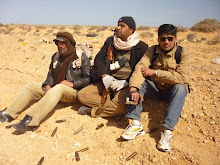Early in the morning we hired a taxi to take us to Benghazi some 500 kilometres from Tubruk. The previous night after flying half way across the world we had driven almost a thousand kilometres. Another group of journalists joined us and our cavalcade zipped through the cold north African desert. Nothing but rocks and sand for miles. The road was smooth. All cars were headed in the opposite direction – towards Egypt. Cars, buses and trucks all loaded beyond capacity with suitcases and bags piled on rooftops and hanging precariously from the sides. 300 kilometres and 3 hours later the landscape changed suddenly. The sand was replaced by red soil and rocks by lush green grass and trees. The sun disappeared behind clouds and it began to rain. A good omen I thought. As temperature dropped further I asked the driver to roll up his side of the window. It is broken, he smiled. I saw no reason too. Despite three layers of clothing, both Shiv and I were cold and wet.
We reached Benghazi by 5 in the evening. It was deserted. A ghost town. The vibes were rather negative. The first hotel we went to refused to take us. The rates had shot up to $ 200 per day. Every hotel had only journalists from all over the world. We then moved to Tibesty hotel – locals say the best in the city. The hotel had no rooms and no internet. Our hearts sank.
Early in the morning at Turbruk I had requested a Japanese journalist if we could use his Beegan system to uplink just two pieces to camera to India – just to establish our presence in Libya. He had very kindly consented. It must have cost his company a packet but he refused to accept the money we offered, In my school days I had read somewhere that Japanese were very helpful people. This action had confirmed it. Colonel Muammar Gaddafi’s Libya had no internet. We had no means to send our feed to India.
Since phone lines were down we could not even ask our office in New Delhi to book a 10 minute feed for us either through the Associated Press or the EBU. We sent smses but none reached Delhi. We were cold and hungry but since both Shiv and I cover security issues and spend time with soldiers from across the world – our morale usually remains high. By late evening one journalist checked out of the hotel – moving back to Cairo because he had not been able to communicate with his office for 6 days. We checked into his room. We went to the town centre and were amazed to see thousands of Libyans assembled there – singing – dancing celebrating ``freedom from Gaddafi.’’
``This is real freedom. Two generations have not experienced this,’’ said a 50-year-old. Colonel Muammar Gaddafi has been at the helm of affairs for 42 years and with the much feared intelligence agents all over – nobody ever spoke their mind. This time they not only abused Gaddafi openly – savouring every word like a sweet dessert – they also openly talked of democracy, rights and freedom. ``Had we done so even three months earlier we would have been locked up in a secret prison and our family would never have heard of us,’’ he added.
Little children played on tanks that had been sent to crush the movement. A major part of the Libyan army deployed in the east rebelled against Gaddafi and joined the freedom fighters. There was a carnival at the square on the Mediterranean coast. Despite the icy wind people were rejoicing in the new found freedom. Even if some seniors warned the celebrations were a bit premature. The people of Benghazi may have succeeded in pushing back Gaddafi’s forces freedom is still a distant dream.
Distances in this country are killing. From Tubruk to Benghazi was more than 500 kilometres. Aj Dabiah and Brega where pitched battles took place between forces loyal to and opposing Gaddafi were another 200 to 300 kilometres away. Ras Lanuf the major oil hub and port another 500 kilometres away from Benghazi. In the next 48 hours Shiv and I travelled to all these places.
With Issam Khalil, an expat who returned to join the freedom struggle we followed a convoy of fighters from Benghazi to Ras Lanuf. This was an experience I will never forget. But more on it later.
(to be continued…)
Subscribe to:
Post Comments (Atom)



No comments:
Post a Comment